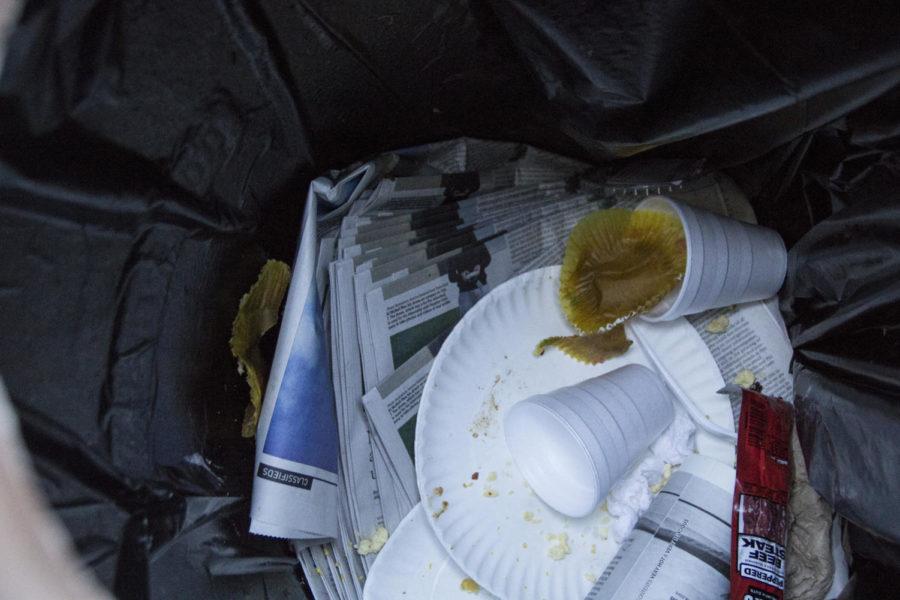Iowa State Daily reports newspapers stolen
October 8, 2014
Copies of the Oct. 8th edition of the Iowa State Daily were stolen and thrown away in various buildings around campus.
In buildings such as the Memorial Union, Parks Library, Union Drive Community Center and more, newspapers were taken out of the newsstands and thrown into garbage cans. The theft happened in at least 23 buildings around campus. There are about 70 ISD newspaper stations.
The Iowa State Daily reported the incident to the Iowa State University Police Department at about 11 a.m. Oct. 8.
“We’re always talking about how we need to be more educated,” said Iowa State Daily Editor-in-Chief Stephen Koenigsfeld. “Some [people] took that away from students. They took the right to be informed.”
A person, who wished to remain anonymous, emailed the Iowa State Daily after she witnessed a couple of women wearing long-sleeved, mint green shirts take an entire stack of ISD newspapers from the stand of the West Lounge in the Memorial Union and throw them in the trash.
Adam Goldstein, attorney advocate for the Student Press Law Center, said most cases such as this would be classified as theft. Those responsible could even be arrested.
“Publisher’s Clearing House gives out a million dollars. That doesn’t mean if I go steal a million dollars from Publisher’s Clearing House, they can’t prosecute me because they were giving it away anyway,” Goldstein said. “So the same thing is true here. The ability of an owner to dispose of property doesn’t mean the property can’t be stolen.”
Goldstein said university newspapers report similar events up to about 30 times each year to the SPLC. He said newspaper theft happens more with college publications because readers don’t often have to pay to pick up a newspaper.
ISD CEO Laura Widmer said members of the ISU community can pick up one copy of the Daily for free, but after the first copy, each paper is 40 cents.
A day’s worth of papers costs about $1,100 to print. The Daily’s circulation each day is about 12,000 copies distributed throughout campus and a few Campustown locations.
“This idea that people can come in and steal papers, it takes away from the viability of a free press,” Widmer said. “That’s not what our constitution is built on. You can’t control the news by stealing the news.”
Goldstein said most often, large student clubs or organizations often steal the papers. These large organizations have a “bunch of people who can coordinate with each other and have a common interest,” he said.
Goldstein said most student newspapers report it through a university judicial branch or local police. He said if found guilty, the thieves often have to pay restitutions for the cost of reprinting or loss of advertising.
Sara Kellogg, assistant dean of students, said if students were reported as involved in the theft, they would go through the university disciplinary process. She couldn’t say what exact repercussions would be.
“In the paper [Oct. 8], facts were reported, and if someone didn’t like facts of a particular story, you can’t change the police record. Unfortunately, they may not understand, but whoever has stolen the paper — the individual, many individuals — have committed a crime,” Widmer said.
Another student publication at Iowa State had copies stolen from stands last year. Ethos, a magazine on campus, had its spring 2013 edition, which featured ISU basketball player Bubu Palo, taken from stands and thrown in the trash.
Dennis Chamberlin, faculty adviser to Ethos, said the staff found out who stole the magazines but no action was taken against that person.
Another newspaper reported its stolen copies to SPLC this week. The student newspaper at Elmhurst College in Illinois told SPLC its papers were stolen after reporting on a sorority that was accused of hazing.
“What’s a great irony in all of this is that, you used to be able to think you could get away with it. Today, that paper is online. You can’t steal online, thank goodness,” Widmer said. “Hopefully the university community will understand that a free press is a free press.”

















